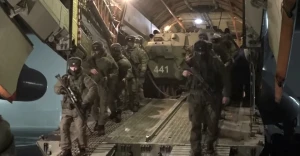
Putin decided to grant Assad asylum, says Putin's spokesman Peskov
The decision to offer asylum to Syrian dictator Bashar al-Assad and his family was reportedly made by Vladimir Putin, according to the Russian leader’s press secretary Dmitry Peskov
TASS reported the information.
According to Peskov, Russia "will continue to analyze the situation in Syria," and Russian troops there "are taking all necessary measures."
Peskov emphasized that the decision to grant asylum to Assad was made by Putin, but he did not clarify where the Syrian dictator currently is. He also noted that there is no official meeting scheduled between Putin and Assad.
"The goals of the Astana format have been lost, but it will continue to work as a mechanism for exchanging views," said Peskov, adding that Moscow is establishing contacts to ensure the safety of Russian troops in Syria.
TASS and RIA Novosti, citing their sources, reported on December 8 that Syrian dictator Bashar Assad, along with his family, flew to Moscow, where Russia allegedly granted them asylum.
Assad and his family arrived in Moscow where, "based on humanitarian considerations," Russia offered them asylum.
"Russia has always advocated for a political solution to the Syrian crisis, based on the need to restore negotiations under the auspices of the UN. Russian officials are in contact with leaders of the armed Syrian opposition, who have guaranteed the safety of Russian military bases and diplomatic facilities in Syria. We hope for the continuation of political dialogue in the interests of the Syrian people and the development of bilateral relations between Russia and Syria," the source said.
U.S. President Joe Biden stated that the United States is unsure of Assad's whereabouts but is monitoring reports that he is seeking asylum in Moscow, according to AP.
What is happening in Syria
In Syria, a large-scale military operation by opposition forces against government troops continued. The Syrian opposition began a major offensive on the morning of November 27, capturing 56 towns in the Aleppo and Idlib provinces within two days and advancing towards the outskirts of Aleppo.
On Saturday, November 30, Russian aviation carried out airstrikes on Aleppo for the first time since 2016, as Syrian rebels reached the city center. At the same time, Russia promised additional military support to Assad's regime.
On the same day, Reuters reported, citing military sources, that Syrian rebels had captured the town of Maarat al-Numan in Idlib province, thereby taking control of the entire province.
The Russian authorities decided to dismiss the commander of the Russian forces in Syria, Sergey Kisel, amid losses and growing panic among Russian troops. The situation for the Russian contingent in Syria is worsening as rebel forces advance in the south, with urban battles taking place in Hama, Homs, and Suwayda.
The Ukrainian Ministry of Foreign Affairs stated that Russia and Iran bear responsibility for the security situation’s degradation in Syria.
On December 4, the U.S. military carried out a defensive strike against weapons systems in eastern Syria. On December 5, Syrian rebels entered the key central city of Hama, with regime forces withdrawing from the city. The next day, the Ukrainian Ministry of Foreign Affairs urged citizens to avoid traveling to Syria.
As of December 6, Syrian rebels, led by the jihadist group Hay'at Tahrir al-Sham (HTS), advanced towards Homs, Syria's third-largest city. Additionally, the U.S.-backed alliance, led by Syrian Kurds, seized Deir ez-Zor, the main city in eastern Syria and a key border crossing with Iraq.
Turkish President Recep Tayyip Erdoğan offered to help Syrian leader Bashar Assad shape the future of Syria, but his proposal was rejected.
On December 7, Syrian opposition forces declared control over the city of Daraa in the southwest of the country. Later, rebels claimed they had entered the capital, Damascus, and announced the fall of dictator Bashar Assad's government. The president allegedly fled the country.
There is a high likelihood that Syrian President Bashar al-Assad may have died in an air crash on December 8 while fleeing the country as rebels approached the capital. In Russia, it is said that he decided to leave the country himself.
On Sunday, December 8, the Russian Federation began withdrawing its military ships from the Syrian port of Tartus after rebels captured Damascus.
Later, Syrian Prime Minister Muhammad Al-Jalali stated that the country needed to conduct free elections to allow its people to choose their leadership.
Bild reported that Assad planned to transfer power to pro-Turkish forces and leave for Russia. Negotiations regarding this transfer took place in Doha, the capital of Qatar.
- News











































